In Victoria and Kowloon on Nathan Road were many shops and bazaars in the side streets. They were full of goods of every description and luxuries from all over the world that were not available in England. It really opened our eyes. And at what appeared to be bargain prices with every price negotiable, and we became adept at it. Our first purchases were civilian clothes for these we were allowed to wear off duty, and then we looked at watches and cameras.
Sundays
If we happened to be in on a Sunday Ian Styles and I occasionally attended evensong at the Cathedral and the Church of England form of service being a reminder of things at home. While on this topic we had formal Church parades at times and visits from an army chaplain but religion never figured large in our lives. Though one of our fellow squaddies was a devout Plymouth Brethren who each night knelt at his bedside and said his prayers.
Chinese Tradesmen at Camp
A Chinese tailor in camp quickly make something to measure as the camp cobbler quickly made shoes. Having these made was simplicity itself; one pointed to an illustration in a magazine, he ran a pencil around your feet on a piece of cardboard and named a price, once that was settled the shoes were ready within a few days. I got a good hand made pair for HK$ 25 (about 30/-shillings or one US dollar.)
As we got the camp into order and became accustomed to our life under canvas the construction of corrugated iron Nissen huts to replace our tents commenced. This in turn meant we had once again to move the tents. From this it appeared our lot might improve. That was not to be for in typical army fashion as they were being completed we were told, toward the end of May, that the Battery was to move to Ping Shan, or Quarry Camp.
- Gunner Flann at Lo Wu Camp
- Lo Wu camp looking east.
- Crest Hill New Territories
- View into China from OP Easter 1950.
- Lo Wu, New Territories, Easter 1950
- Clearwater Bay, New Territories, May 1950
- Clearwater Bay, New Territories, May 1950
- Calibration, Clearwater Bay New Territories, May 1950
- Calibration, Clearwater Bay New Territories, May 1950
- John Flann, Clearwater Bay Calibration Base, May 1950.

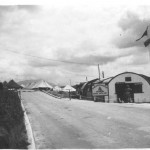
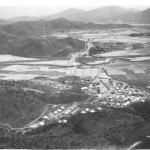
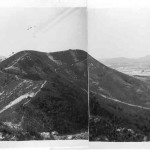
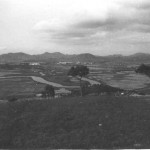
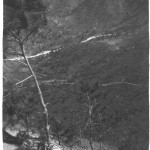
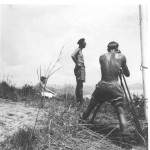
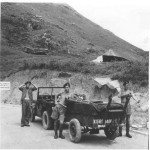
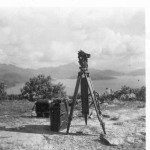
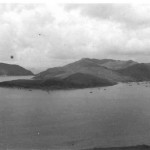
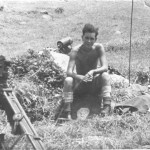
Pretty accurate description, the plane you mention was a ‘Mustang’, after the radio station in Shum Chun.
Thank you John for those remarks and your interest in my story. It’s even more interesting that after sixty five years the event is remembered. It did too at the time make an impression. It all happened so suddenly and was over so quickly. Not something that usually occurred at morning parade.
It appears you have some knowledge of the incident, can you add anything more about it?
Hi John.
I have followed you account with much interest.
You have the facts.
Perhaps you remember the typhoon that followed almost directly after we erected the tents, and demolished the lot. Incidentaly, i remember that after the rain, while a mob of naked soldiers were trying to get some order, a concert party called ‘The Four Aces. appeared and were quickly ushered the Officers Mess to avoid embarrassment ( not ours, I think).
Hey ho.
John.
John, it is apparent from your remarks you and I served time together at Lo Wu, will you say in what capacity?
I can’t say I can recall you directly but in some manner your name seems familiar. I look forward to learning a little more about you.
I think the plane incident and the typhoon were two particularly memorable events at Lo Wu, though it’s probably also true to say the whole experience of Lo Wu is unforgettable.
And I’ve certainly forgotten about that concert party but I can’t forget the hilarity that ensued in course of the torrential rains and its consequences. Something along the lines of a schoolboy lark.
One other matter I have since learned about was the strenuous effort involved in manpacking all the gear up to the OP was subsequently avoided because mules were later employed on the duty instead of of us squaddies. Some had it cushy!
So glad you got in touch, and If you have anything more to add please feel free to do so. How long ago it all was.
My regards,
John.
Hi,John.
As far as I was involved in the in the “man packing’ exercise, the practice of using mules never happened, as it was thought that the animal could carry little more than a soldier and was not as docile.
John, It was after our time. It seems remarkable that mules were employed at all. Why use a mule when you have a squaddy?
Character forming yes, and it did us no harm. It makes me smile when I hear complaints from teen agers about some aspects of their lot today. As was said “…they need to get their service in..”
Please keep up your remarks and tell us something of your NS experience. You clearly retain memories of it.
Regards,
John.
Hi,John ,
I was a regular, a fourth generation ‘gunner’,Your observations as a National Service man are very interesting.I was sorry to hear of Tim Tate-Smith, I bumped into him in Moulton(?) in ’71,while I working on the Shale belt.Bill Hale.Captain Ret.and Major Tilburn Ret,have now gone, but I was lucky enough to serve with them later and they both supported me at my wedding.I left the Army as a W.O. Surveyor 1, A.R.I. working overseas most of the time, including seven years with the S.O.A.
My infrequent visits to the U.K. persuaded me that I would not live there, We now live happily in a small town in France, where I am accepted as a welcome foreigner, not the case in the United States of Britain. So now you have it,Take care,
John.
Very interesting John, sad about Tim TS-we were good friends and he was best man at my wedding-and delighted in Sergeant Hale making Captain well deserved and at which I am not surprised and Capt Tilburn, as was, getting his majority. He was a gentleman and respected us. I thought highly of him. As I did also of Surveyor Sergeants and Warrant Officer’s, accomplished Surveyors RA and good soldiers who set a good example to us squaddies.
Can you say a little more about your service and the gentlemen in question?
I’m not surprised at your living outside of the UK, the USofA has been good to our sons and to us and we could not visualize living elsewhere. I’m glad you are happy with your new life. As we are here. There’s something to be said for starting one in later years. What is amusing about ours is that one day we were residents of staid Tunbridge Wells and immediately on my retirement, of Montana. Different in so many ways!
You did inquire about Brian’s story. I’m sorry there I can’t provide the translations you sought but I can say its purpose is a placeholder for subsequent contributions. The most likely first one is of a Surveyor RA with 15 Locating Battery as it became, and his experiences in Korea.
I now realize you don’t have the same tale as mine, but we do have shared expereinces and if you would care to let us know about them there will be any number of interested readers. And, of whom I should be one. If so please let me know and I can arrange it.
It was so very kind of you to get in touch and I do so appreciate it.
And you too, take care.
John.